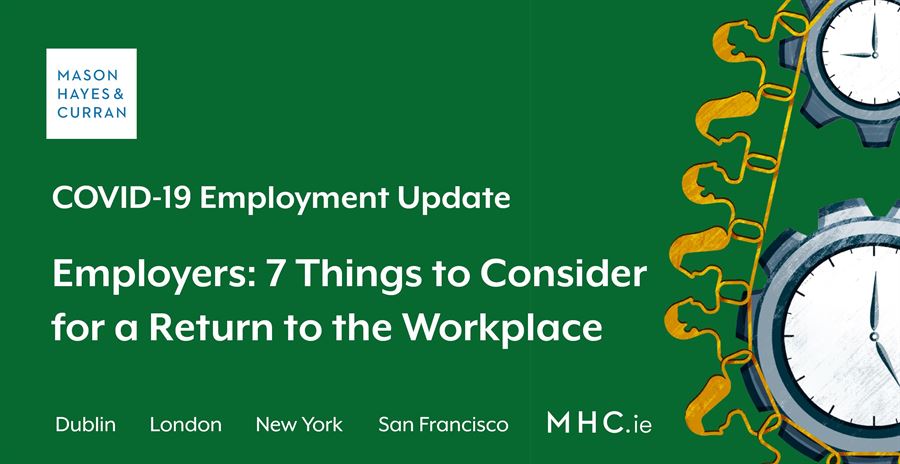
Ireland entered Stage 2 of the Roadmap for Reopening Society and Business on Monday 8 June with further easing of restrictions to be accelerated. This means employers will be faced with the welcome problem of dealing with employees returning to a very different workplace.
Returning to work
From 8 June 2020, most retail outlets have re-opened with shopping centres and the retail stores inside them permitted to re-open from 15 June 2020. All employees who cannot work remotely are expected to be able to return to work by Stage 4 of the Government’s roadmap beginning on 20 July.
Employers are however expected to follow the Government’s advice on health and safety measures in the workplace under the Return to Work Protocol. Given the emphasis on ensuring social distancing amongst various other measures, workplaces will be very different to the ones before the pandemic and will likely mean many employees will be working remotely for the foreseeable future. More information on the Return to Work Protocol is available in our recent update here.
All employees returning to work will be required to complete a return to work form at least three days in advance of returning. Employees must also cancel the Pandemic Unemployment Payment if in receipt of it when returning to work. Employers should remind employees of this and that information on recipients will be shared amongst Government bodies to avoid duplication in payments or payments to those no longer eligible.
Business travel
The Irish Health Authorities require anyone coming into Ireland, apart from those coming from Northern Ireland, to self-isolate for 14 days upon arrival and to complete a Public Health Passenger Locator Form to this effect. The extent of business travel is expected to decline significantly with the impact on employees of a 14 day quarantine period when returning to Ireland being a significant barrier to such business, and indeed personal travel. The requirement to restrict movements could also impact the ability to start work immediately for employees coming to work in Ireland.
Temporary Wage Subsidy Scheme
The COVID-19 Temporary Wage Subsidy Scheme has helped many employers continue to pay employees during the pandemic. The scheme has been extended to the end of August 2020, which will give employers some comfort on their ability to continue to pay wages for the coming months. It has also recently been extended to include staff who previously did not come within the scheme, for example employees returning from maternity leave.
Two key conditions for an employer to qualify for the wage subsidy scheme are:
-
A 25% reduction either in the turnover or in customer orders, and
-
That the business is unable to meet normal wages or normal outputs
Although there is no clear direction on it yet, we are of the opinion that as business start to re-open and turnover picks back up, employers should keep an eye on whether they continue to meet the eligibility criteria. It is expected that some form of checks will be conducted at a later date by Revenue on the eligibility of employers for the scheme.
Employees still on layoff
Employees who remain on temporary layoff or have lost their jobs as a result of the pandemic will continue to receive the COVID-19 Pandemic Unemployment Payment until 10 August 2020. It will however move, from 29 June 2020, from a flat rate of €350 per week to the following:
- Employees whose prior earnings were €200 per week or higher will receive €350 per week, and
- Employees whose prior earnings were up to €199.99 per week will receive €203 per week – the primary rate of payment of the Jobseeker’s Benefit scheme.
The suspension of the entitlement for employees to seek a redundancy payment for lay-off or short time for a period exceeding four consecutive weeks or six weeks in any thirteen week period has also been extended. This suspension will remain in place until 10 August 2020 by which time it is expected all those temporarily on layoff will have returned to work.
7 things for employers to consider
The workplace is unlikely to look the same for quite some time. Employers now need to consider the following tasks post-lockdown:
-
Update risk assessments and take measures in light of the Return to Work Protocol
-
Arrange for risk assessments of employees' remote working spaces for those who continue to work from home
-
Ensure employees complete the return to work form at least three days before they return to the workplace
-
Monitor eligibility criteria for the Wage Subsidy Scheme
-
Update policies on sick leave, holidays, business travel and remote working in light of the different issues
-
Update data privacy notices to reflect the new data being collected and the reasons for collection
-
Consider how to deal with employees who may not feel comfortable returning to work or who are advised not to
For more information on facilitating a safe and seamless return to work for your employee, contact a member of our Employment & Benefits team.
The content of this article is provided for information purposes only and does not constitute legal or other advice.





